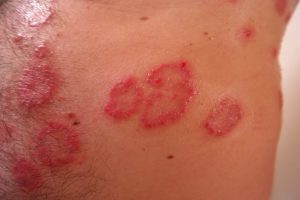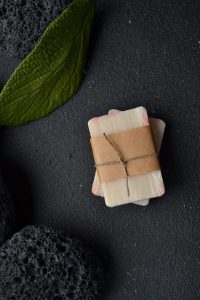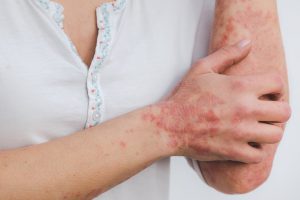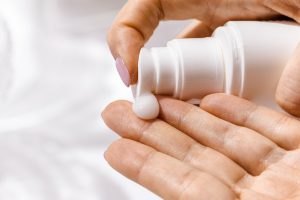Are you experiencing dry, scaly, or itchy skin? And have you been hoping that it will eventually go away on its own? Well, if it’s not going away on its own, but is persistent, you might have a skin condition like psoriasis or eczema. These two similar conditions, which both cause rashes, are very common: more than 7 million Americans have psoriasis, while over 30 million have some type of eczema. Knowing the difference can help you identify your condition, learn what is causing it, and determine how best to treat it. And because August is Psoriasis Action Month, there is no better time to learn how to take care of your rash.
What Is Psoriasis?
Psoriasis is a chronic autoimmune condition that is not contagious, and which causes skin cells to overproduce; as the excess skin cells die, they build up into scales, making the skin red, inflamed, and itchy. There are multiple types of psoriasis, but plaque psoriasis is the most common one, accounting for 80-90% of cases of the condition. There is no cure for it, but there are some topical pharmaceutical treatments that can help control the condition.
It is unclear what causes the immune system to become overactive and trigger psoriasis, but genes and family history can play a role in who develops it: approximately 40% of people with psoriasis have a family member with the condition, and if one parent has psoriasis, their child has a roughly 30% chance of also having it. Stress, smoking, and certain infections, such as strep throat, can trigger psoriasis, but it usually appears when you are young (between the age of 16 and 22).
What Is Eczema?

Eczema is a long-term condition that is marked by inflammation of the skin, often as a reaction to dyes, fabrics, soaps, and other irritating substances. It is actually a group of skin conditions, including the common types: atopic dermatitis, seborrheic dermatitis, and contact dermatitis. Atopic dermatitis is the most common type of eczema, with over 18 million Americans suffering from it.
Eczema typically occurs in people with a family history of asthma, hay fever, or other allergies, and if a parent has eczema, their child is 2-3 times more likely than other children to develop it, as well. In fact, although adults can develop the condition, eczema is most common in babies and children, and usually appears as early as 6 months; while many children will outgrow the condition, many will have it for their whole lives.
What Do Psoriasis & Eczema Look Like?
In looking at the two conditions, it can be hard to tell the difference visually between the two. “You have to look at all the clinical aspects of a rash to distinguish between eczema and psoriasis, including the history and the patient’s other medical problems,” according to dermatologist Anthony Fernandez, MD, PhD.
Symptoms of psoriasis include:
- Patches of red, thick, raised skin
- Scaling of the plaques
- Different sizes of plaques
- Itchy plaques

Symptoms of eczema include:
- Dry skin
- Inflamed, peeling, or cracked skin
- Blistered or pus-filled skin
- Itchy skin
- Rashes on the elbows, behind the knees, or on the face, hands, and feet
One of the most obvious clues that can help differentiate the two is fluid leaking from the skin, which points to eczema. “When we see that, we definitely think about eczema instead of psoriasis,” he says. “But there are definitely times when we cannot tell the difference. And, in those cases, we will perform biopsies.”
Easing Symptoms
You can ease symptoms of these skin conditions by using over-the-counter treatments, such as salicylic acid, lactic acid, calamine, and coal tar. Other things you can try include:
- Practicing good skin care by keeping your skin moisturized, especially after you shower and in dry environments
- Avoiding hot water, harsh soaps, washcloths, or other things that can irritate your skin
- Avoiding long, hot baths or showers
- Avoiding triggers that can worsen symptoms
- Eating a healthy diet
- Drinking more water
- Exercising regularly
If none of the above helps, and the symptoms of your psoriasis or eczema are staying the same or getting worse, speak to a dermatologist. They can prescribe topical medicated treatments that reduce inflammation, redness, and itching. Your doctor can also prescribe:
- Immunosuppressive drugs, or oral medications to reduce your body’s immune activity
- Phototherapy, or ultraviolet light treatment
- Topical cortisol
- Biologics, which are shots that target a specific molecule in each disease
If you have eczema or psoriasis, you are not alone. You can live an active life with either condition, but they can be very uncomfortable, so if you are experiencing any of the above-mentioned symptoms, see your doctor to determine which condition you have, as well as to learn how to treat it and avoid triggers.
If you have a condition like psoriasis or eczema that needs to be treated by a specialist and requires medications to control, you could end up with big medical bills, especially if you do not have insurance, or if your current plan is insufficient. If you are looking for health insurance to cover dermatologist visits or treatments for skin conditions, EZ can help. We can compare plans from the top-rated insurance companies in the country in minutes, and find an affordable one that provides the coverage you need, so you can pay less out-of-pocket. Our services are free, so you can focus on finding a great plan with no hidden costs. No obligation. To get free quotes, simply enter your zip code in the bar above, or to speak to a licensed agent, call 888-350-1890.



